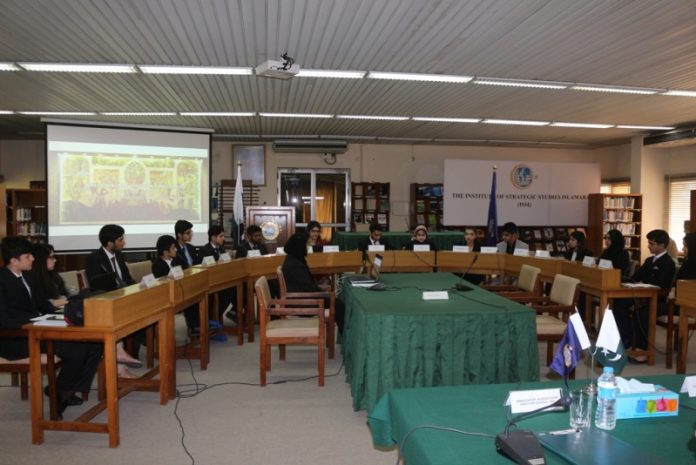Press Release
“UNSC Simulation”
The Institute of Strategic Studies Islamabad (ISSI), in collaboration with The Millennial Roots School, organised a United Nations Security Council (UNSC) simulation exercise on July 21, 2016. The event was a full scale simulation of the UNSC, its rules of procedures, negotiations and adoption of a resolution. It was an exercise for the students to actively participate in understanding Syrian crisis, and come up with a resolution to end the crisis. They all gave their respective countries’ statements and passed a resolution on how to end the crisis effectively while taking all the stakeholders on board.
The Millennial Roots students simulated the actual proceedings of the UNSC by playing the roles of all member country delegates. The group of students comprised of both O levels and A levels students. The session was opened by Japan’s Permanent Representative to the United Nations, Abdur Rafay Manzoor, in his current capacity as the President of the UNSC. The Secretary General, Fiza Maqbool, made an official statement and briefed the entire council on the state of affairs in Syria. Following that, the ministers and the permanent representatives of all respective countries put forth their official stances on the Syrian conflict. The Secretary General expressed grave concerns about deteriorating situation in Syria, killing by both sides, gross human rights violation, and by far the worst humanitarian crisis in the Middle East. The countries unanimously emphasized the need for a non-military peaceful solution to the crisis in Syria and stressed that the humanitarian suffering be brought to an immediate end.
A resolution titled S/2016/22 was presented in the Security Council by New Zealand, co-sponsored by France, Spain, Japan and the United Kingdom. The resolution included important decisions such as the imposition of a No-Fly zone in the Syrian Arab Republic except the humanitarian aid flights from the international community. It also urged all the parties to join hands in defeating the different terrorist groups such as the Al-Qaeda, ISIL and the Al-Nusra Front. It was proposed that a ceasefire be implemented as soon as possible for longer periods of time so that effective peace negotiations can ensue. The resolution proposed an inclusive political process in Syria including all stakeholders in order to draft a new constitution within 18 months of the elections. The well-rounded content of the resolution also discussed the suggestions for an arms embargo in Syria, effective immediately. The resolution was unanimously adopted by all 15 member states of the UNSC.
Distinguished delegates from non-member states of Syria, Iran, Saudi Arabia, Iraq, Qatar and Turkey also made statements regarding their countries’ stance on the matter. Syria expressed its anger and dire apprehensions about the raging conflict on its land and urged the world community to formulate and implement a peace-building framework. The UNSC stance was that the need of the hour is to impose a ceasefire in Syria, bring the disputed parties to the peace talks and to end the bloodshed. Humanitarian assistance must be extended to all war-affected people in Syria without any ethnic or political discrimination. It was also stressed that all the decisions made in the previous Geneva conventions on Syria must be respected. The resolution was unanimously adopted.
After the simulation, Ambassador Masood Khan, Director General ISSI, who was President of the UNSC, in Jan 2013, appreciated the preparation and effort of all the participants and complimented them for having simulated the real UNSC successfully. He recognized the singular contribution made by Fiza Maqbool (Secretary General of the UNSC), Abdur Rafay Manzoor (President of the UNSC) and Saanya Afroze (Permanent Delegate of New Zealand to the UNSC). He also appreciated the efforts made by Arhama Siddiqa, Research Fellow, and her team comprising of Fatima Raza, Areeba Khan, Muhammad Taimur Khan and Ume Farwa. He, then, gave a few pointers for improvement of the debating style of the students and mentioned that the speeches made by the students were as excellent as the ones delivered in the actual UNSC. Ambassador Masood Khan, Director General ISSI, explained the rules of speech, elocution and pronunciation to the students for improving their public speaking ability. He also enlightened the audience on the details of the proceedings at the UNSC sessions in light of his personal experiences.
Fatima Raza/ Ume Farwa













